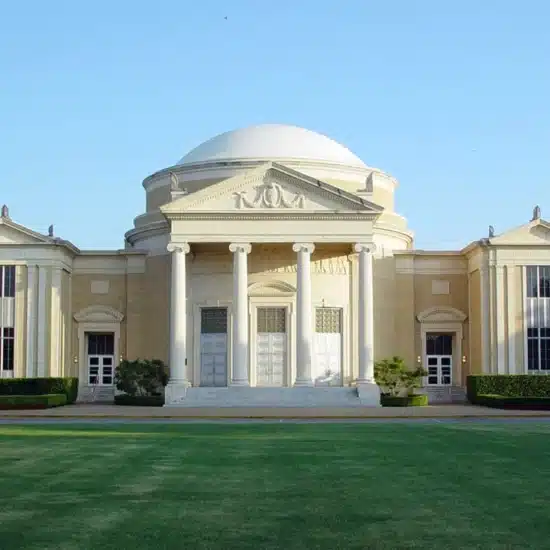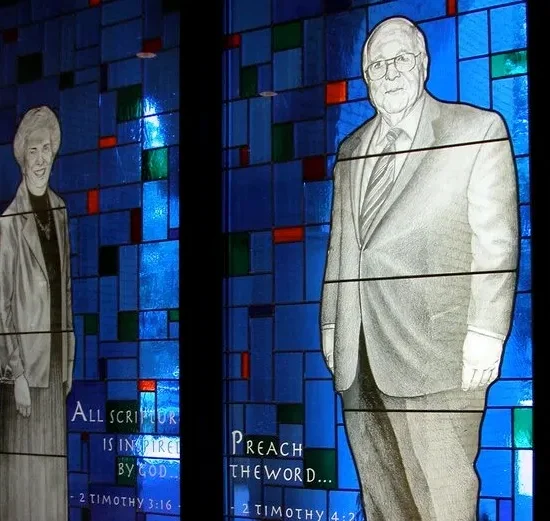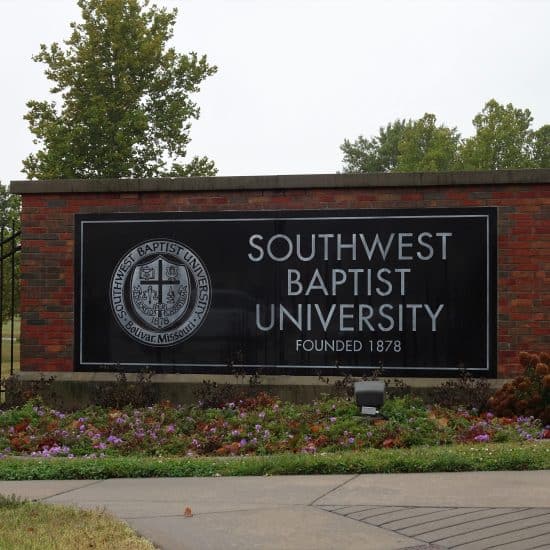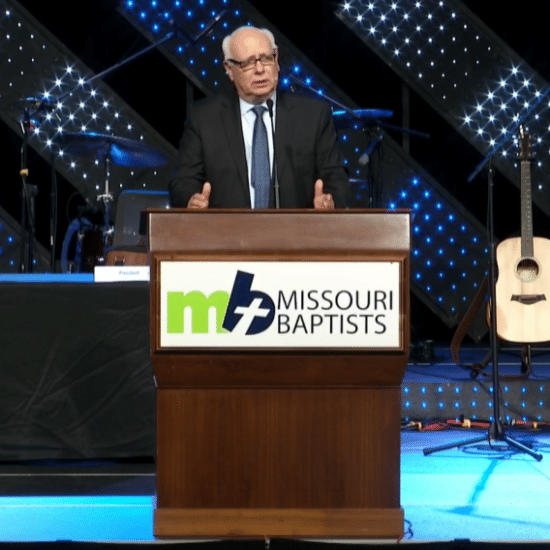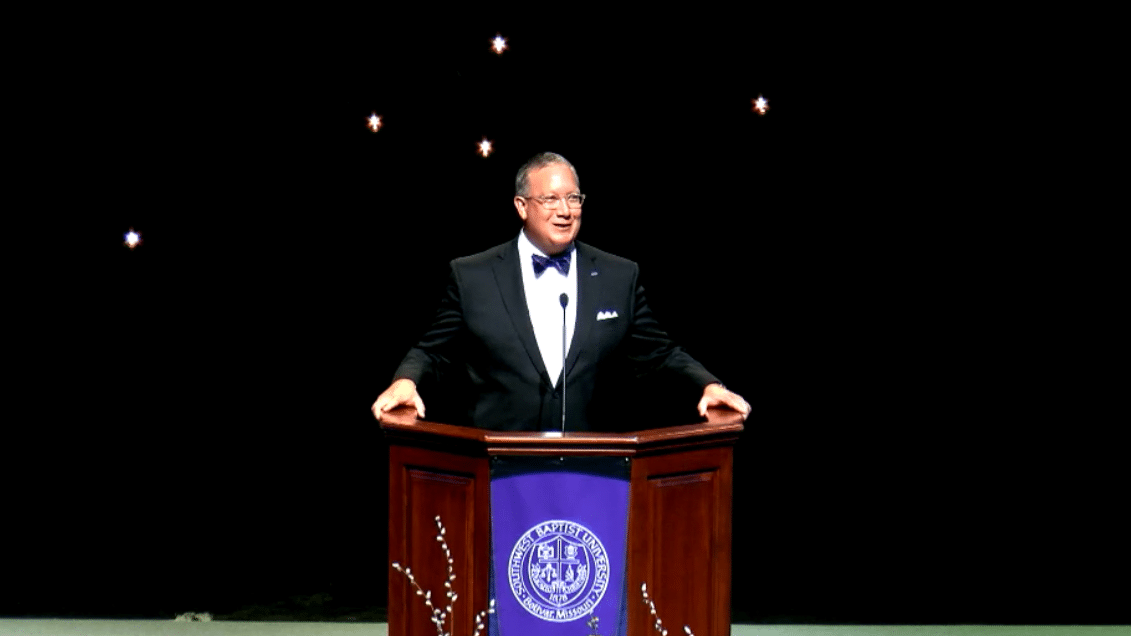
On Friday (Aug. 20), Southwest Baptist University announced its new president to lead the school in Bolivar, Missouri, after its previous president resigned amid an ongoing nearly three-year conflict over power and theology. Rick Melson, vice president for advancement at Cedarville University in Ohio, will become SBU’s 26th president, after a career of working for controversy-plagued Christian institutions.
SBU’s presidential vacancy started after Eric Turner announced his resignation on Oct. 20, 2020, amid conflict with the school’s Board of Trustees that included efforts to remove him. Although unanimously elected to the presidency barely more than two years earlier, Turner found himself at odds with Missouri Baptist Convention leaders pushing for greater legal control over the institution. After Turner’s election, the MBC deviated from standard practice to reject SBU’s choices for trustees, and Turner announced his resignation just before the new MBC process would select a majority of the Board.
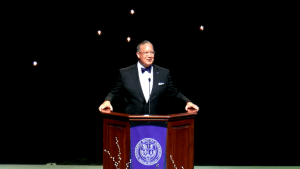
Screengrab as Rick Melson offers remarks on Aug. 20, 2021, after his introduction as Southwest Baptist University President-Elect.
Melson is no stranger to such institutional conflict. His current school, Cedarville, previously underwent turmoil much like SBU’s, and Melson worked for Mars Hills Church under the leadership of the controversial Mark Driscoll. Melson also worked for several years at Bethlehem Baptist Church under John Piper, in addition to ministry roles in Alabama, Ohio, Texas, and elsewhere.
Mars Hill Church
In 2009, Mars Hill launched Resurgence Training Center, an unaccredited graduate program to train pastoral leaders. Melson started as RTC’s founding executive director, and he served as executive elder and campus network director for Mars Hill. For the first year of RTC, he taught a course called “Leader as King” to “focus on the pastor as king,” and co-taught with Driscoll a “missional practicum.” He said at the time that the RTC program would focus on being Reformed, urban, and missional. And he called RTC “a significant effort to build a lasting legacy out of the ministry of Mars Hill Church.”
According to the original vision of RTC, they planned to launch 100 campuses over the next decade to train thousands of pastors and deacons. But 12 years later, RTC doesn’t exist. Nor does Mars Hill Church. As Christianity Today recently documented in their podcast The Rise & Fall of Mars Hill, scandals involving Driscoll and his abusive leadership style led to the collapse of the megachurch and its ministries in 2014.
But the warning signs about Driscoll existed even before Melson joined the Mars Hill team in 2009. In 2007, Driscoll sparked controversy as he pushed bylaw changes to consolidate power and then fired — and held ecclesiastical trials against — two pastors who argued against the changes.
New scandals erupted in 2009 before the start of RTC. The Southern Baptist Convention’s Baptist Press ran a piece earlier that year critiquing “Driscoll’s vulgarity,” noting that pastors like John MacArthur had criticized Driscoll’s language for years. In fact, Driscoll had gained a reputation as the “cussing pastor.”
Bott Radio Network, a conservative Christian radio station with dozens of radio programs in Missouri and neighboring states, pulled a program mid-show for interviewing Driscoll and ordered its stations not to feature him. The next month, messengers to the SBC’s 2009 annual meeting made five motions that targeted Driscoll, his books, and his organizations.
Although Driscoll survived the earlier controversies, he eventually found himself under growing public criticism in 2014 from former Mars Hill elders and members for abusive, authoritarian leadership. Groups started removing him from conference lineups and his books from their shelves. He resigned on Oct. 14, 2014, and the church that the previous year had a weekly attendance of more than 12,000 shut down just over two months later.
And while Melson didn’t stay at Mars Hill beyond the first year of the RTC program, he has been mentioned as part of the problems at the church.
Sutton Turner, one of the executive pastors at Mars Hill, wrote a 2012 memo about financial troubles at the church that was published two years later by Warren Throckmorton (a Christian professor whose blog broke numerous scandals involving Driscoll and Mars Hill).
“We have a culture that is plagued by poor stewardship, entitlement, December’s Hail Mary strategy, and using of the Church to build a personal ministry. The first cultural problem is a stewardship and a heart issue that has been around for years and has seen leaders lead in poor stewardship of church resources. Leaders like Pastor Scott, Rick Melson, and others have help create this environment as other top leaders looked as if they agreed/endorsed the practice,” Turner wrote. “As we have recently seen from Pastor Scott and before Rick Melson, there is a sense of entitlement that all staff members need to have a personal ministry/business/consulting outside of or on top of Mars Hill Church. Many times these personal ministries are done during staff time and using church resources.”
Cedarville University
After his tenure at Mars Hill, Melson spent time as a consultant before in 2012 becoming vice president for advancement and external relations at Houghton College, a Wesleyan school in New York. During his time there, another Christian school sparked frequent national headlines for various controversies: Cedarville University in Ohio.
The president of the school resigned, tenured professors were fired, religion professors left due to opposition to new creedal statements, the philosophy major was axed, criticism was leveled against the school by the American Association of University Professors. That sentence describes SBU during the 2020-2021 academic year, and Cedarville nearly a decade earlier.
Originally founded as a Presbyterian school, Cedarville College in 1953 merged with the Baptist Bible Institute of Cleveland. The combined school became affiliated with the General Association of Regular Baptist Churches, a fundamentalist offshoot from American Baptist Churches USA. However, after the school formalized a relationship with Southern Baptists in Ohio, the GARBC cut ties over concerns of liberalism and ecumenicalism in the Southern Baptist Convention.
The firing of two tenured professors in 2007 sparked a lawsuit and criticism from the AAUP on academic freedom. In 2011, the school’s trustees adopted more rigid doctrinal statements, which led to a theology professor the next year being placed on leave and then dismissed. Then the school’s president unexpectedly announced his resignation in October 2012, followed in January 2013 by the resignation of the vice president for student life after criticism for bringing some speakers on campus like Shane Claiborne.
Others who no longer felt they could fit with the school’s new direction also left, including the only woman teaching in the Bible department and other women in administrative roles. Trustees voted to end the philosophy and physics majors.
In the aftermath of the school’s rightward shift, Melson joined as VP in 2016. But the controversies for the school didn’t end.
New trustees joined the school’s Board during the earlier controversies, including then-Southwestern Baptist Theological President Paige Patterson. After SWBTS fired Patterson for mishandling allegations of student rapes, Patterson resigned from Cedarville’s Board amid an anti-Patterson petition from students and alumni.
The rape victim whose allegations led to Patterson’s fall later claimed Cedarville’s president, Thomas White, was part of the initial cover-up. White worked for Patterson at Southeastern Baptist Theological Seminary for three years and then at SWBTS for another nine years — including as a vice president — before becoming Cedarville’s leader in 2013.
In 2020, White faced additional controversy after he acknowledged he knowingly hired a man fired from a church for sexual misconduct to serve as a student recruiter, basketball coach, and theology professor. It is not known what Melson knew about the hiring. After the controversy broke, White fired the individual accused of misconduct, and Cedarville’s Board of Trustees placed White on administrative leave on May 1, 2020. However, the Board reinstated him the next month, though that move led two trustees to resign in protest.
Similar concerns arose about SBU’s presidential search committee as advocates for victims of clergy sexual abuse criticized the makeup of the committee.
Just as at Cedarville, Melson again seems attracted to a school still reeling from the disruption of a rightward shift that sent many longtime professors looking for jobs elsewhere.
In fact, a Word&Way analysis comparing SBU’s current faculty listing to that list at the start of the 2020-2021 academic year shows the school starting this year with 11% fewer professors. Although some new professors joined, it doesn’t replace the 16% who left. Hit particularly hard were the areas of behavioral sciences (down 29%), art (down 33%), and philosophy (down 100%).


